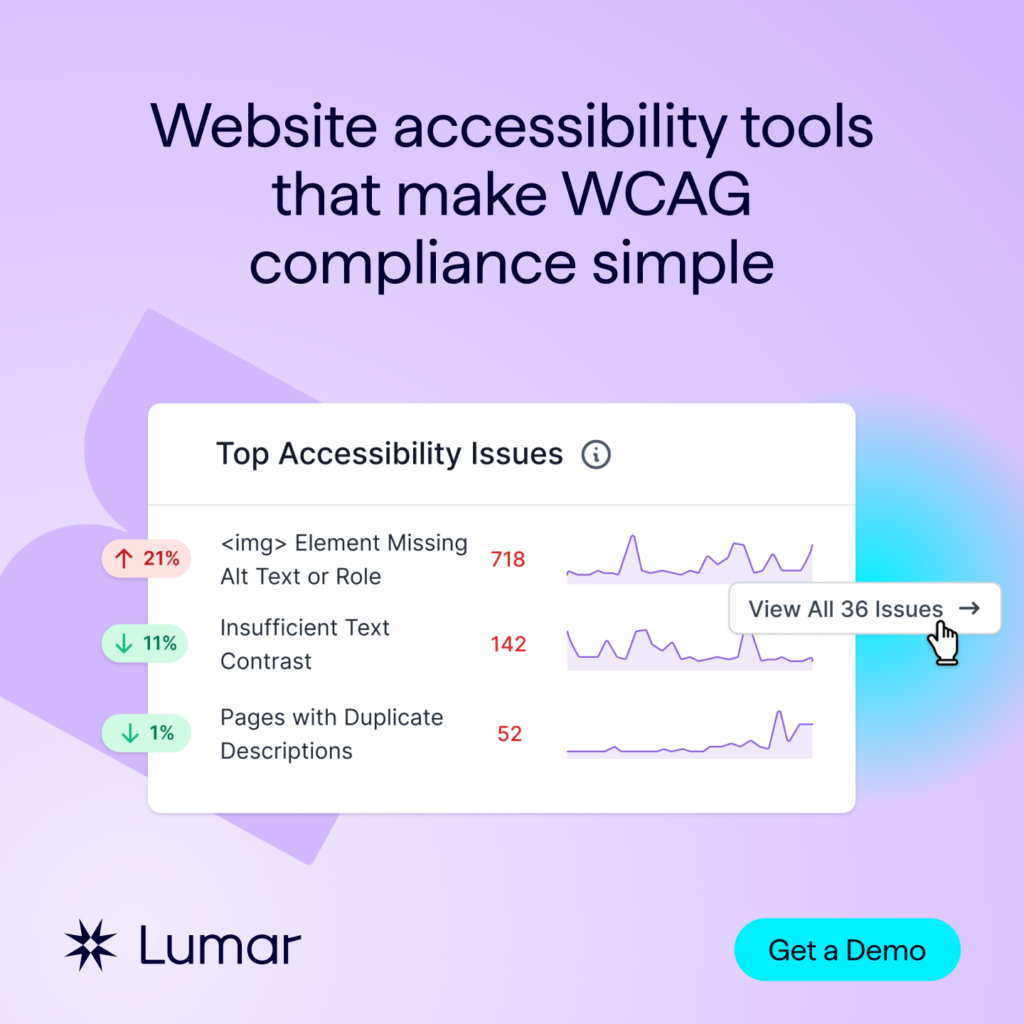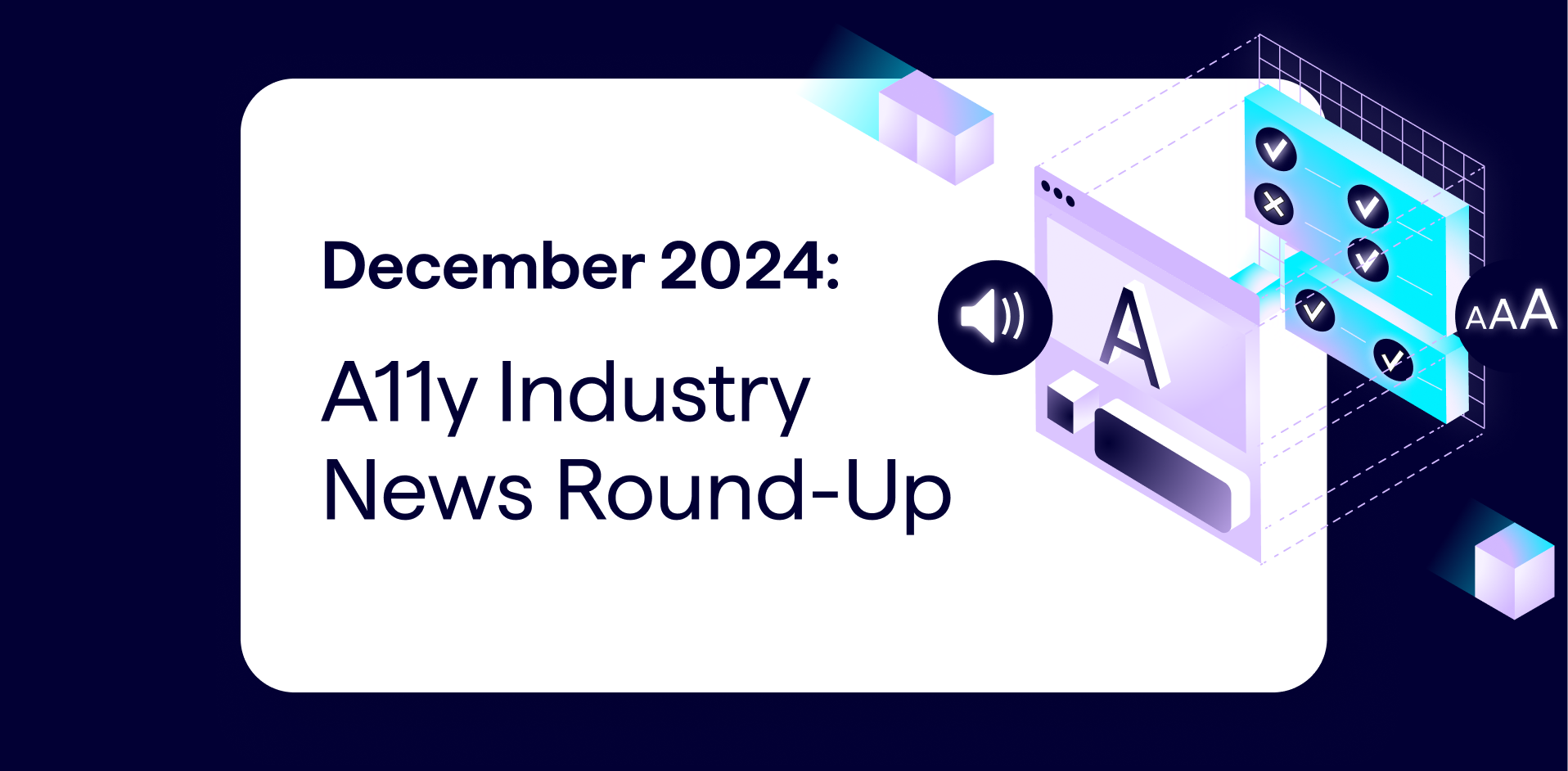What happened in digital accessibility news this month?
Each month, the Lumar team rounds up some of the top headlines for website managers and web accessibility professionals, with some help from our a11y expert friends at QualityLogic.
This month, our accessibility news roundup includes:
- A report on improvements in digital accessibility initiatives made by US state governments in 2024.
- A new survey shows that 45% of those with relevant job titles remain unsure whether the upcoming European Accessibility Act applies to them.
- New recommendations for enacting digital accessibility standards in US schools before the 2026 ADA deadline.
- A11y advocates raise concerns about meeting Ontario’s goal of “full accessibility” by the intended 2025 date.
Read on for the top digital accessibility news stories this month.
Survey finds 45% do not know whether the upcoming European Accessibility Act (EAA) applies to them
In the recently released “Attitudes to Digital Accessibility” report compiled by AbilityNet, nearly 500 people whose jobs directly involve designing, developing, leading, and planning for accessible experiences responded to survey questions. The survey found that 45% of professionals whose jobs are impacted by accessibility regulations did not know whether or not the upcoming European Accessibility Act (EAA) applied to them.
Other survey findings include:
- A Lack of Regulatory Knowledge: 45.2% of respondents were still unsure if the upcoming European Accessibility Act (EAA) applies to their organization.
- A Lack of Accessibility Resources: 55% of respondents mentioned a lack of internal skills or experience as a significant obstacle to implementing a11y best practices. Less than 1/3 of organizations provide general digital accessibility training for all staff.
- A11y Motivators: Protecting brand reputation was important to 48.1% of respondents, an increase from 35.9% in 2023.
- A11y Motivators: Legal compliance motivations rose from 63.5% in 2023 to 72.4% in 2024.
(Source: QualityLogic & AbilityNet )
US state governments made numerous digital accessibility improvements in 2024
In 2024, local and state governments in America made notable efforts to increase access to digital services for people with disabilities. According to GovTech, “Part of this stems from the U.S. Department of Justice’s April issuance of a final rule under Title II of the Americans with Disabilities Act requiring all state and local governments to make digital services accessible for use by people with disabilities.”
In Massachusetts, the government appointed its first Chief IT Accessibility Officer, Ashley Bloom, who also serves as chair of the state’s Digital Accessibility and Equity Governance Board. Pennsylvania and Texas have also both appointed digital accessibility roles.
Other notable digital accessibility moves by state governments this year include the launch of a new accessible online information hub for New Jersey residents with disabilities to find necessary support and services and the 2024 state accessibility compliance deadline for Colorado, which led to the adoption of new accessibility tech tools by state agencies.
On the federal level, the US Access Board will be presenting its preliminary findings on the use of AI for the disability community next month.
(Source: GovTech )
A11y recommendations for US schools to meet the 2026 ADA digital accessibility deadline
The Center for American Progress (CAP) released a new digital accessibility guide for US schools in November. The guide addresses how K-12 schools can better ensure digital accessibility in accordance with recently strengthened Americans with Disabilities Act (ADA) rules relating to technological barriers to accessibility.
The date by which school districts must adhere to the updated digital accessibility rules is April 2026 or April 2027, depending on their size.
The CAP recommends that schools adopt a 4-phased approach to improving digital accessibility:
- Conduct a digital accessibility needs assessment and develop a strategic plan for technology integration.
- Complete an audit of digital tools and identify the feasibility of achieving full accessibility.
- Revise vendor agreements, evaluate existing policies, and explore new policies and guidance to prioritize digital accessibility.
- Cultivate partnerships; prioritize artificial intelligence accessibility; and provide training and resources for educators, students, and families.
Emphasis is placed on aligning with federal standards, leveraging assistive technologies, and integrating training programs for staff and students. The article also underscores the long-term value of accessible technology in education and the need for sustainable investments to enhance both equity and innovation.
(Source: Center for American Progress, “A Multiphase Road Map to Digital Accessibility for K-12 Schools”)
A11y advocates worry that Ontario is nowhere near meeting its 2025 accesisbility goals
The Ontario Legislature enacted the Accessibility for Ontarians with Disabilities Act (AODA) back in 2005, with a 20-year goal to meet stringent accessibility standards in 5 key areas:
- Information and communication
- Employment
- Transportation
- Customer Service
- Design of Public Spaces
The AODA’s a11y standards apply not just to physical accommodations but also to websites and technology accommodations.
Despite the goal’s imminent January 2025 timeframe, the chair of the AODA Alliance, David Lepofsky, told CBC in November:
“We are nowhere close to being accessible by 2025 and we’ve been warning the government about this for years.”
A spokesperson for Ontario’s Seniors and Accessibility Minister, however, has told the CBC that the province has had historic spending on infrastructure to improve accessibility, that all 444 municipalities in Ontario must have accessibility plans in place, and that, “”Ontario is meeting, achieving, or exceeding the AODA standards across the province.”
The AODA applies to all businesses and organizations with more than 20 employees and failure to meet its standards for accessibility can result in hefty fines.
(Source: CBC News )
Ready to improve accessibility on your own website?
Get a demo of Lumar’s web accessibility platform and start on your journey toward a more accessible, WCAG-compliant online experience.








